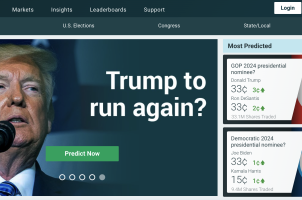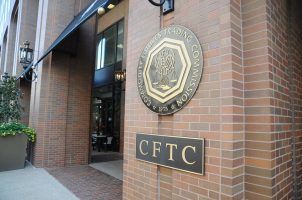CFTC’s PredictIt Claims Focus on Relationship Between Aristotle and New Zealand University
Posted on: March 6, 2023, 01:00h.
Last updated on: March 6, 2023, 11:56h.
Nearly nine years ago, when the US Commodity Futures Trading Commission granted a New Zealand university a no-action letter to establish what’s known as PredictIt, an online political futures exchange, the federal regulatory agency set some ground rules for the site.

The CFTC’s requirements included that Victoria University of Wellington operate the exchange as a nonprofit venture. However, in a letter sent last Thursday to Victoria University Vice-Provost of Research Dr. Margaret Hyland, CFTC Division of Market Oversight (DMO) Director Vincent McGonagle said its staff has determined that Aristotle International, a for-profit company based in Washington, DC, is the actual operator of the exchange.
That’s one of three findings announced by the CFTC, seeking to revoke PredictIt’s no-action status.
A partially redacted copy of the letter was included in a filing the commission made with the US Fifth Circuit Court of Appeals on Friday. The CFTC wants to nullify an injunction the court ordered last month that allowed the exchange to continue trading past a February 15 liquidation date the commission listed in a previous letter revoking the no-action status.
In Thursday’s letter, McGonagle said the agency was canceling the August 4 letter and issuing the new letter in its place. The new communique is considered an “initial determination” letter and allows the university to respond by March 20.
The purpose of Victoria University’s request and DMO’s no-action letter was that the market … would be unregulated,” McGonagle wrote. “Yet, because of these violations, DMO and other CFTC staff have been required to devote considerable time over the last nearly nine years to the market. This has far exceeded the level of CFTC staff involvement contemplated by (the no-action letter), and we believe it is not an appropriate use of taxpayer resources.”
The August 4 letter is the focus of a lawsuit filed by PredictIt and Aristotle, along with several traders and researchers who use the site. In Friday’s filing, the CFTC argued that since it withdrew the old letter and issued a new one, the injunction should be lifted, and the plaintiffs’ appeal should be dismissed.
CFTC Questions University’s Role
The redacted portions of the letter concern the CFTC’s claims that Aristotle operates the exchange and that both a university subsidiary and Aristotle have profited from operating the exchange.
According to a footnote inserted in the letter as part of the court filing, the CFTC said Victoria University requested “confidential treatment” to references of a document. The redactions appear to be for an agreement between the university and Aristotle for services connected to PredictIt’s operations.
When it applied for the no-action letter, the university said it would contract a third party to perform “know your customer” and age checks on individuals wanting to participate in the exchange.
“While the university may have been operating the market at its inception, it appears that at some point, the university ceded operational control of the market to Aristotle … Indeed, recent public statements reflect that the university may not have been operating the market since its inception and rather that Aristotle played a leading – and undisclosed – role in the development and launch of the market,” McGonagle wrote in Thursday’s letter.
McGonagle’s letter also cited claims made by Aristotle’s attorneys during oral arguments before the Fifth Circuit last month that indicated PredictIt was a joint venture from the beginning. That, the director said, would be “inconsistent with the conditions” of the no-action letter.
In 2014, Victoria University proposed the exchange because it believed the markets would provide valuable data to researchers studying political science, game theory, microeconomics, and other fields.
Victoria University ‘Assessing’ CFTC Letter
The PredictIt exchange offers two-way markets for political events. Since the US doesn’t allow wagering on politics, it’s considered the closest option to political betting.
Winning contracts are paid out at $1 per share, and traders can move in and out of positions until that market closes. In addition to the claims about the university’s and Aristotle’s relationship, the CFTC also claims that 17 markets offered on PredictIt violated the no-action letter’s terms.
Since the August 4 letter, PredictIt hasn’t issued any new markets for trading. While the federal lawsuit sought to overturn the letter completely, the injunction sought — and received — by the plaintiffs only focused on keeping existing markets, including those tied to the 2024 presidential election, open past February 15.
Victoria University responded to a request for comment from Casino.org on Sunday evening (Monday in New Zealand).
“Te Herenga Waka (the Maori name for the school) — Victoria University of Wellington confirms it has received further correspondence from the CFTC regarding PredictIt, which it is currently assessing,” the statement said. “The university has no further comment at this time.”
Aristotle General Counsel David Mason, a former chairman of the Federal Election Commission, said in a statement Friday the company rejects the CFTC’s findings.
“We plan to continue to fight this prejudiced attempt to shut down this useful market,” he said.
Related News Articles
US Regulators Block Political Betting Proposal
Most Popular
Tropicana Las Vegas to be Imploded, Tentative Date Set
VEGAS MYTHS BUSTED: Golden Gate is the Oldest Casino in Vegas
Most Commented
-
End of the Line for Las Vegas Monorail
— April 5, 2024 — 90 Comments















Last Comments ( 2 )
Charles you’re a goddamn moron. You paid $270 for 27,000 shares of the WRONG answer, and you think your’re owed money.
PredictIt has stolen $22,677 from me, and more from other users. Do not pretend like they are victims here. They are criminals and they should all be in jail... as well as the faculty of Wellington University and any "professor" who had a hand in this criminal institution.